A last vestige of 19th-century anti-Catholic bigotry
"(T)he Government of the United States ... gives to bigotry no sanction, to persecution no assistance," President George Washington wrote in 1790.
There's no time like St. Patrick's Day to reflect on Massachusetts' bitter legacy of 19th-century anti-Catholic bigotry, which still blocks parents of all faiths from choosing their children's schools.
This wasn't always so. The Pilgrims came here seeking religious freedom, while Puritan dissenters saw themselves as the new Israelites. John Adams' original 1780 Massachusetts Constitution granted the legislature and towns wide authority for public support of religious instruction.
But, by the 1850s, after tens of thousands of souls fleeing the Irish potato famine arrived in the Bay State, these Irish-Catholic immigrants were confronted by ethnic and religious prejudice.
In 1854, the Know-Nothing Party combined a cunning platform of anti-Catholic nativism and some progressive reforms to pull off the largest electoral landslide in Massachusetts history. Led by its Gov. Henry J. Gardner -- whose portrait still occupies a prominent position in the State House -- the Know-Nothings promulgated a flood of appalling laws, including a constitutional amendment cutting public funds to religious school parents.
That "Anti-Aid," or Blaine Amendment, is among the oldest and worst of similar constitutional amendments in 38 states that are rooted in 19th-century anti-Catholic animus and now prevent religious families from accessing the schools of their choosing.
Massachusetts state education officials have also been rightly reprimanded by the United States Department of Education for illegally blocking between $150 million and $300 million in federal special education funding, intended for Catholic and Jewish day school students in the last decade.
Psalm 129 reads: "Let Israel say; 'they have greatly oppressed me from my youth, but they have not gained the victory over me.'"
In a few states across America, including Rhode Island and New Hampshire, over 300,000 families annually benefit from state-funded private and religious school choice programs through scholarship vouchers and education tax credits.
Until recently, one such parent was Kendra Espinoza of Montana, who suddenly became a single mom and sought a better education for her two daughters. In the public schools, one daughter was bullied and the other struggled academically. Both would later thrive in a parochial school.
After the Montana Supreme Court struck down her state's education tax credit program, Espinoza was denied access to scholarships her children needed. The basis for the Montana court's decision was that state's 130-year-old Blaine Amendment.
This winter, the U.S. Supreme Court (SCOTUS) heard her potentially landmark case, Espinoza v. Montana Department of Revenue, which could banish state Blaine Amendments and the last legal vestiges of 19th-century anti-Catholic discrimination that negatively impact religious and urban families alike.
If the SCOTUS strikes down these Blaine Amendments, which were conceived in prejudice, it would allow state school funding to follow the student, as it does in higher education. All parents could then choose from a variety of private, parochial, public charter, and vocational-technical school options for their children.
With Catholic schools closing throughout Massachusetts, there's no time to waste. Researchers estimate that as many as 50,000 Catholic schoolchildren here would benefit from wider private school choice if the Know-Nothings' bigoted legal barriers weren't standing in their way.
Anti-Catholic and anti-religious attitudes are disturbingly persistent. In a country founded on constitutionally protected religious liberty, we must be ever-vigilant about government discrimination against religious families who seek to access school choice to educate their children.
RAYMOND FLYNN IS THE FORMER U.S. AMBASSADOR TO THE HOLY SEE AND MAYOR OF BOSTON. JAMIE GASS DIRECTS THE CENTER FOR SCHOOL REFORM AT PIONEER INSTITUTE, A BOSTON-BASED THINK TANK.
- Raymond L. Flynn is the former U.S. Ambassador to the Holy See and Mayor of Boston.



















